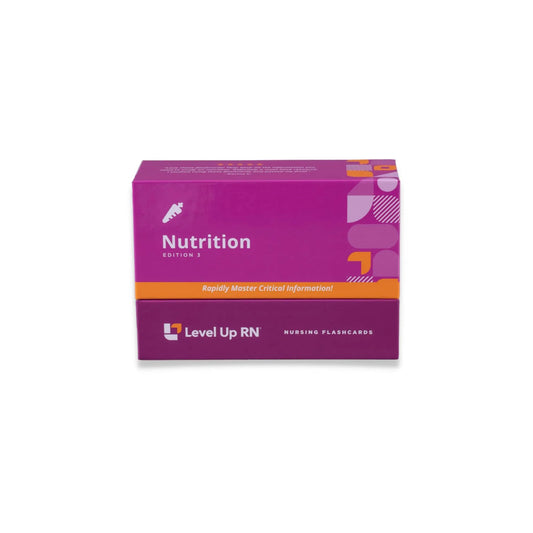Hi, I'm Cathy with Level Up RN. In this video, I will be discussing nutritional guidance for cardiovascular disorders, including coronary artery disease, hypertension, a myocardial infarction, and heart failure. At the end of the video, I'm going to give you guys a quiz to test your understanding of some of the key points I'll be covering. So definitely stay tuned for that. And if you have our Level Up RN Nutrition Flashcards, go ahead and pull them out so you can follow along with me.
First, let's talk about coronary artery disease, which causes impaired blood flow and oxygen delivery to the heart due to atherosclerosis, which is the buildup of plaque on the arterial walls. Individuals with coronary artery disease are advised to consume a heart-healthy diet and to implement heart-healthy lifestyle changes. I'll be going over this information at the end of the video because a heart-healthy diet and heart-healthy lifestyle changes are recommended for all of the cardiovascular disorders that I'll be covering in this video.
Next, we have hypertension, which is high blood pressure. In addition to a heart-healthy diet and lifestyle, individuals with hypertension are advised to limit their sodium intake to less than 1,500 milligrams per day. This is because increased sodium intake causes water retention, and this increases the fluid volume in the body, which in turn raises the blood pressure.
Now let's talk about a myocardial infarction, or MI, which is the sudden blockage of blood flow to the heart. After an MI, a patient will, of course, be encouraged to consume a heart-healthy diet and to implement heart-healthy lifestyle changes. They may also be encouraged to eat small, frequent meals as opposed to larger meals, which can increase myocardial oxygen demand. And then some nursing textbooks may also recommend that the patient decrease their caffeine intake in order to prevent myocardial stimulation. However, recent studies show no association between moderate coffee intake and cardiovascular events following an MI.
The last cardiovascular disorder we're going to talk about is heart failure, which is the inability of the heart muscle to pump enough blood to meet the body's needs. If the patient has fluid retention related to their heart failure, then sodium and fluid intake will likely be restricted. Fluid intake is often restricted to less than 2 liters per day, and sodium intake is often restricted to under 2,000 milligrams per day.
Now let's talk about the key characteristics of a heart-healthy diet. Two specific diet plans that are considered to be heart-healthy include the DASH diet and a Mediterranean diet, which are similar in many ways. Key components of a heart-healthy diet include fruits, vegetables, whole grains, and healthy proteins such as fish, poultry, nuts, beans, and low-fat or fat-free dairy. In addition, a heart-healthy diet limits saturated fats, trans fats, sweets, and sugar-sweetened beverages.
In terms of lifestyle changes that promote heart health, it's important to get regular physical exercise, maintain a healthy weight, limit alcohol intake, avoid nicotine and smoking, manage stress levels, and get enough good quality sleep.
All right. It's quiz time, and I've got three questions for you.
Question number 1. Individuals with hypertension are advised to limit their sodium intake to under blank milligrams per day?
The answer is 1,500.
Question number 2. The DASH diet and a Mediterranean diet are heart-healthy eating plans. True or false?
The answer is true.
Question number 3. What diet restrictions would you expect to be put in place for a patient with heart failure who is hospitalized due to fluid retention?
The answer is their fluid intake will be restricted, and their sodium intake will be restricted as well.
All right. That's it for this video. I hope it was helpful. Thank you so much for watching, and good luck with studying.
[BLOOPERS]
After a patient has ana-- habebebah. The electadeberban.


